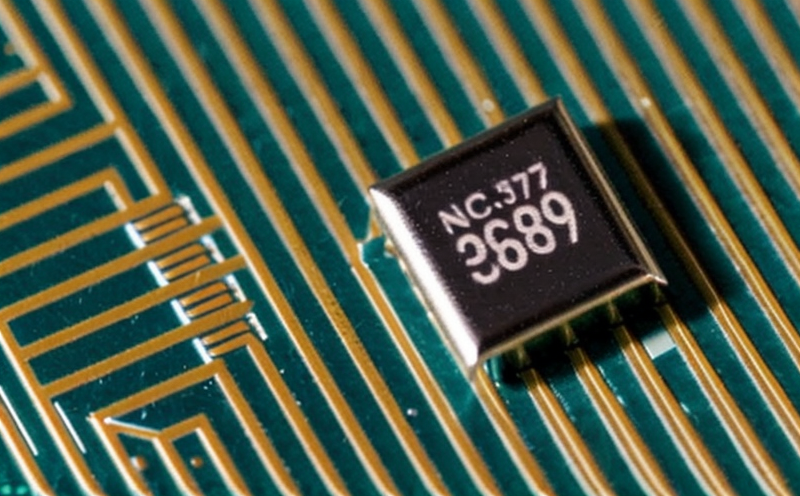JEDDEC JESD22-A128 Microchip Thermal Resistance Testing
The JEDEC JESD22-A128 test method is specifically designed to evaluate the thermal resistance of semiconductor devices, particularly microchips. This is a critical aspect in ensuring that electronic components can withstand the operating conditions they will face during their lifecycle without degrading or failing.
Thermal resistance testing is essential for quality assurance and reliability engineering teams within the electronics industry. The test assesses how effectively a device dissipates heat from its active junction to the ambient environment, which directly impacts the microchip's performance, efficiency, and longevity.
The JESD22-A128 standard outlines precise procedures for testing microchips under various conditions that simulate real-world operating environments. Compliance with this test is mandatory for manufacturers aiming to meet stringent industry standards and ensure their products can operate reliably over extended periods without overheating or failing.
Our laboratory utilizes state-of-the-art equipment capable of replicating the rigorous environmental conditions stipulated by JESD22-A128, ensuring accurate and repeatable test results. By adhering to this standard, we provide clients with reliable data that can be used for product development, quality assurance, and regulatory compliance.
Understanding thermal resistance is crucial in preventing microchip failures due to overheating. Excessive heat can lead to reduced performance, shortened lifespan, or even catastrophic failure of the device. Therefore, it's imperative for manufacturers to test their products under controlled conditions that mimic actual usage scenarios.
The JESD22-A128 testing process involves subjecting microchips to specific thermal stresses and measuring the resulting temperature changes over time. This helps identify any potential weaknesses in the design or manufacturing process, allowing engineers to make necessary improvements before releasing products into the market.
By leveraging our expertise in JESD22-A128 compliance testing, we assist clients in meeting regulatory requirements while also enhancing product performance and reliability. Our services go beyond mere compliance; they contribute significantly to the overall quality of electronic components used across various industries.
Scope and Methodology
| Test Condition | Description | Methodology |
|---|---|---|
| Initial Ambient Temperature | The microchip is placed in an environment where the temperature is controlled to a specified value. | The initial ambient temperature is set using precision-controlled environmental chambers. The temperature is stabilized before introducing the specimen for accurate baseline measurements. |
| Heating Power Applied | A defined amount of electrical power is supplied to the microchip. | The heating power is delivered through a regulated power supply connected directly to the microchip. The current and voltage are continuously monitored during the test duration. |
| Temperature Rise Measurement | The increase in temperature from the initial baseline is measured over time. | A thermocouple or similar sensor is attached to the microchip's junction for continuous monitoring. The temperature data is recorded at regular intervals. |
| Thermal Resistance Calculation | The thermal resistance (Rth) is calculated using the formula Rth = ΔT / P, where ΔT is the change in temperature and P is the power applied. | The collected data is processed by specialized software to calculate the thermal resistance. This value indicates how efficiently heat is dissipated from the active junction of the microchip. |
In summary, the JESD22-A128 test method involves controlled environmental conditions, precise power delivery, continuous temperature monitoring, and accurate calculation of thermal resistance. These steps ensure that the test results are reliable and provide valuable insights into the microchip's performance under stress.
Benefits
The benefits of performing JESD22-A128 compliance testing on microchips extend beyond mere regulatory requirements. By adhering to this standard, manufacturers gain several advantages:
- Enhanced Product Reliability: Ensures that microchips can function reliably under expected operating conditions, reducing the risk of failures due to overheating.
- Faster Product Development: Early identification of design flaws through rigorous testing allows for faster correction and refinement of products.
- Better Customer Satisfaction: Reliable microchips contribute to more durable end products, leading to higher customer satisfaction and loyalty.
- Cost Efficiency: By identifying issues early in the development process, manufacturers can avoid costly recalls and repairs after product release.
- Compliance with Industry Standards: Meeting JESD22-A128 ensures that microchips meet global industry standards, facilitating easier market entry and broader customer acceptance.
In conclusion, conducting JESD22-A128 compliance testing is not just a regulatory requirement but also a strategic investment in product quality and customer satisfaction. Our laboratory offers comprehensive services to help clients achieve these benefits effectively.
Customer Impact and Satisfaction
The impact of JESD22-A128 compliance testing on customers is profound. When microchips undergo rigorous thermal resistance testing, manufacturers are better equipped to produce products that meet or exceed industry standards. This leads to several positive outcomes:
- Increased Market Confidence: Compliance with recognized standards like JESD22-A128 instills confidence in customers about the quality and reliability of the product.
- Improved Reputation: Consistent adherence to high-quality testing processes enhances a company's reputation, making it more attractive to potential clients and partners.
- Promotion of Innovation: The insights gained from thorough testing encourage ongoing innovation by highlighting areas for improvement and enhancement.
- Better End-User Experience: Reliable microchips contribute to overall product performance, leading to a better end-user experience and higher customer satisfaction.
Our laboratory's commitment to providing accurate, reliable testing results ensures that our clients are well-positioned to achieve these benefits. We work closely with each client to understand their specific needs and tailor our services accordingly.





